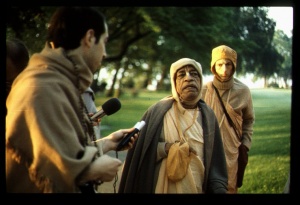SB 6.17.38

A.C. Bhaktivedanta Swami Prabhupada
TEXT 38
- jajñe tvaṣṭur dakṣiṇāgnau
- dānavīṁ yonim āśritaḥ
- vṛtra ity abhivikhyāto
- jñāna-vijñāna-saṁyutaḥ
SYNONYMS
jajñe — was born; tvaṣṭuḥ — of the brāhmaṇa known as Tvaṣṭā; dakṣiṇa-agnau — in the fire sacrifice known as dakṣiṇāgni; dānavīm — demoniac; yonim — species of life; āśritaḥ — taking shelter of; vṛtraḥ — Vṛtra; iti — thus; abhivikhyātaḥ — celebrated; jñāna-vijñāna-saṁyutaḥ — fully equipped with transcendental knowledge and practical application of that knowledge in life.
TRANSLATION
Being cursed by mother Durgā [Bhavānī, the wife of Lord Śiva], that same Citraketu accepted birth in a demoniac species of life. Although still fully equipped with transcendental knowledge and practical application of that knowledge in life, he appeared as a demon at the fire sacrifice performed by Tvaṣṭā, and thus he became famous as Vṛtrāsura.
PURPORT
The word yoni is generally understood to mean jāti-family, group or species. Although Vṛtrāsura appeared in a family of demons, it is clearly said that his knowledge of spiritual life still existed. Jñāna-vijñāna-saṁyutaḥ: his spiritual knowledge and the practical application of that knowledge in life were not lost. Therefore it is said that even if a devotee falls down for some reason, he is still not lost.
- yatra kva vābhadram abhūd amuṣya kiṁ
- ko vārtha āpto 'bhajatāṁ sva-dharmataḥ
- (SB 1.5.17)
Once one is advanced in devotional service, his spiritual assets are never lost under any circumstances. Whatever spiritual advancement he has achieved continues. This is confirmed in Bhagavad-gītā. Even if a bhakti-yogī falls, he takes birth in a rich family or family of brāhmaṇas, in which he again starts devotional activities from the point where he left off. Although Vṛtrāsura was known as an asura, or demon, he did not lose his consciousness of Kṛṣṇa or devotional service.